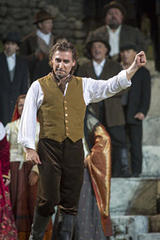| Opera Reviews | 18 April 2024 |
A Puccini/Mascagni double bill opens the 2013 Puccini Festivalby Silvia Luraghi |
|
| Puccini: Il tabarro Mascagni: Cavalleria rusticana Festival Puccini 12 July 2013 |
|
|
After hectic planning at such short notice, the Festival opened on 12 July with a double bill of Giacomo Puccini's Il tabarro and Pietro Mascagni's Cavalleria rusticana, the latter intended as a tribute to the composer in his 150th anniversary. The new productions, directed by Antonio Calenda, with set designer Nicola Rubertelli and costume designer Stefano Nicolao, were on the traditional side: a long boat anchored by a river side offered the setting for the first opera, while the second was staged in a village square, with Mamma Lucia's wine shop at one side. The costumes of the Sicilian women dressed for the Easter mass brought colors to the light gray scene in Cavalleria, while the evening darkness made the atmosphere of Tabarro gloomy and melancholic, as appropriate. In the pit, Alberto Veronesi, the artistic consultant of the Festival, conducted the orchestra with a firm and knowing baton, successfully merging its sound with the stage. Two of the singers, baritone Alberto Gazale and tenor Francesco Anile, bravely performed in both operas. Gazale was well cast, both as Michele in Tabarro, and as Alfio in Cavalleria. Indeed, the two characters have much in common, as they both act prompted by jealousy, and do not seem to have doubts regarding their reactions. Vocally, the two roles are quite different from each other in terms of tessitura, and this allowed the baritone to showcase the whole palette of his handsome voice, including his ringing top notes. Francesco Anile as Luigi and Turiddu offered a more uneven performance. The volume of his voice is small for such spinto roles, but he was able to master his aria in Tabarro and the final aria in Cavalleria. On the other hand, the initial siciliana in Mascagni's opera was less than compelling, also on account of some notes that did not exactly sound as they should have. Also not especially compelling was the first part of soprano Chiara Angella's performance as Giorgetta in Tabarro. Fortunately, she warmed up during the opera, and both her duets with her two male partners sounded more focused. In Cavalleria, Anda Louise Bogza was not particularly impressive as Santuzza; neither did Silvia Pasini as Mamma Lucia and Renata Lamanda as Lola leave any memorable impressions. As the Festival was announced so late, not many tickets were sold, at least from what one could judge seeing the large open air auditorium with whole sectors left empty. Those who were there, in any case, liked the performance and cheered not only the singers and the conductor, but also members of the production team. |
|
| Text ©
Silvia Luraghi Photo © Fondazione Festival Pucciniano |

 Bad
financial conditions jeopardized this year's Puccini Festival in Torre
del Lago. But this time there was a happy ending, and just three weeks
before opening night it was clear that funding was enough to afford
the current edition.
Bad
financial conditions jeopardized this year's Puccini Festival in Torre
del Lago. But this time there was a happy ending, and just three weeks
before opening night it was clear that funding was enough to afford
the current edition. 





